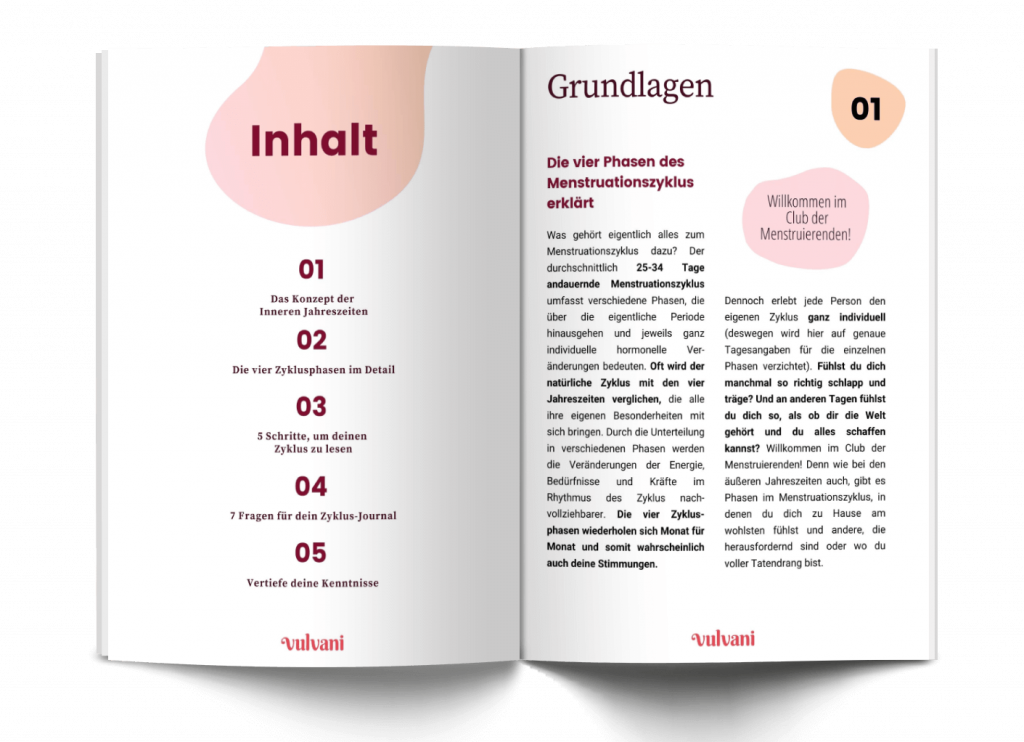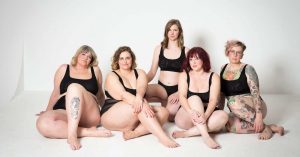
Discovering your menstruation as a spiritual practice
Yasmine understands her menstruation as a spiritual practice and shares in this interview how she is connecting more with her own body through cycle awareness.
*Note: terms related to gender identities are explained in the info box.*
Especially marketing messages and products are strongly designed to supposed gender-specific characteristics, as is the case with menstrual products as well. Menstruation is still far too often associated only with girls and women. Now you may still think, yes, that’s how it is! But not all women menstruate and not all who identify themselves as women menstruate. Say what? Even trans-, non-binary or gender-neutral people can bleed monthly. The presentation of menstruation as an experience shared exclusively by women is therefore not completely right. Cis-sexist assumptions about periods and bodies can exclude and discriminate against certain individuals. Therefore, we use the term ‘menstruating people’ or ‘menstruators’ and try not to speak of women or girls. This is our attempt to start including all people who have menstrual experiences linguistically. Because language matters.
The term ‘menstruating people’ is in no way intended to replace the term ‘women’. Women are women, a group of people who define themselves as women. Menstruating people are an even larger group of people, as there are people who menstruate but do not define themselves as women. However, in the group of menstruating people, women make up the largest percentage in terms of numbers. Since we are, among other things, a menstrual education platform, we usually talk about menstruating people and mean women + other groups with menstrual experiences.
All these terms we are talking about here are not substitutes for the word ‘woman’. They are additional ways of grouping people with similar characteristics together in order to describe them properly and not exclude anyone.
To make it even clearer here is another example: travelers. We can say travelers or traveling people to all people who travel. However, in this group of people there are traveling men and women, but also people who do not identify as men or women, such as non-binary or transgender people.


Another important aspect in this context is that not all cis-women menstruate. This can have different reasons, such as menopause, stress or hysterectomy (surgical removal of the uterus). Some cis-women may have never had their menstruation due to health conditions. However, the lack of menstruation does not make them less of a woman than those who bleed monthly. It is important for statements that define menstruation as a pure source of femininity to pay attention to what the effects of such claims can have on people. Because with these messages the experiences of individual people can be made invisible and the normality of the binary gender system will be further supported.
Language can be complicated and definitions can be contoversial. There are still no expressions or terms with which all people feel 100 percent comfortable. However, one thing is certain: people who do not feel that they are women or men essentially question the idea that gender = genitals. For a better comprehensibility of the text, here is our attempt to give a brief overview of the various concepts around sex and gender identities:
If you are interested to learn more about the topic? Then maybe the Trans 101 glossary with further reading recommendations could be a good recommendation for you!
Vulvani is for all people, all sexes, all genders and all bodies. We want to create an integrative and inviting space for all people, completely independent of gender identities. We want to respect, appreciate and celebrate the diversity of experiences and identities. For even if the majority of people who menstruate identify themselves as girls and women, they are not the only ones. It should be possible for all people to talk about menstruation without being assigned to a particular gender or sex.
‚My body is not female. My menstruation is not female. It just is. My body just is. My body is its own thing. It does what it does, and that’s fine. Getting my period is painful and bloody and messy and annoying, but it doesn’t have to make me feel like less of a guy… Menstruating doesn’t have to be a girl thing.’
(Wiley Reading)
Inclusion and integration are often written off as beautiful ideals or utopias. But when they are practiced, they can make an important difference in the everyday lives of real people. Inclusion is important for everyone, but above all for people who place themselves outside the binary gender system. True inclusion is so much more than what we say. But what we say and above all how we say it is crucial. Who are we talking to? Who do we exclude? Because exclusion already begins with language and is often synonymous with exclusion in everyday life. That is why we are looking for better solutions and terms for all people. And we hope that with Vulvani we can motivate and contribute to a more comprehensive dialogue about menstruation for all people.
If you identify yourself outside the binary gender system, we are especially happy to hear from you in order to make our language and discussions more inclusive for all. Send us a message with your feedback, ideas and tips – we are so excited to hear from you!



Yasmine understands her menstruation as a spiritual practice and shares in this interview how she is connecting more with her own body through cycle awareness.

What options are there for male birth control? Ailsa delivers an overview of what is available now, and what may come in the future.

Sustainable underwear? The founders of TUKEA talk about fair labour conditions, body diversity and body literacy.
…and empower countless women to make empowered choices about their bodies!


24 Comments.
Even separate from the idea of cis and non-cis, I think this is a particularly good argument: “Not all women menstruate..[and] .the lack of menstruation does not make them less of a woman than those who bleed monthly”.
Thank you for moving towards more inclusive messaging! It’s certainly true that, for ages, menarche has marked the transition from childhood to womanhood. But menopause has not, does not, cannot erase the identity or value of those who’ve lived for decades as women. And menopause is only one of the reasons a women might not menstruate. Menstruation is only one facet of being a woman, not necessarily the defining characteristic. And being a woman is only one facet of menstruation.
I’m sorry for those who feel discomfort with more-inclusive language. I’m grateful that there’s such a simple way to reduce the anguish experienced by those who already deal with the dysphoria of living in a society that subtly AND overtly disaffirms oneself.
Hi Christiane, thanks so much for your comment and sharing your thoughts with us! We always love getting input from other people and hear how we can make our communication more inclusive for all. I especially appreciate you pointing out the importance of menopause and how menstruation is just one aspect of being a woman!
Best wishes,
Britta
So, if a woman is define as a menstruating person, is a man then an ejaculating person?
Hi RR,
thanks for your comment. We didn’t say that women are defined as menstruation persons. In fact it’s the opposite.
Women are women, a group of people who defines as women. Menstruating people are an even larger group of people, since there are people who menstruate but do not define as a women. However in the group of menstruating people, women have the highest percentage in terms of quantity.
And yes, men belong to the even larger group of ejaculating people. Larger because, not every person who has the ability to ejaculate, might define as a man.
All these terms we are talking about here, are not replacements to the words women or men. They are additional ways of grouping people as a cluster in order to describe them properly and to not exclude people.
In order to make it more clear another example: travelling people. You can say travelers or travelling people to all the people who travel. However in this group of people, there are men that travel and women, but also people who might not identify as men or women, such as non-binary or transgender people.
Hope that clarifies.
Jamin
Vulvani you need to sell mental help.
Thanks for publishing this great content without questions is very useful
Hi Patrick, thank you for your feedback! 🙂
Instead of taking women out of the vocabulary just write “women+” that is adding and not taking away our gender specific traits. Taking away our gender specific traits takes away their protections.
Hi Christina,
thank you for sharing your thought. We really like your idea.
Then what about women, who do not menstruate due to several reasons like menopause or hysterectomy?
Hi, after reading this I have one remaining question. Why don’t we just say “women and other people who menstruate” then? I don’t wish to be referred to as a “person who menstruates” when the word “woman” describes exactly that and I shouldn’t have the way I identify be redefined by society against my will. Whomever doesn’t want to be referred to as a woman can be addressed as a “person who menstruates” but I prefer to be called a woman and that should be respected as well.
Hi,
thank you for your thought. This is a simiiar direction like Christina’s thought.
However the same question arises:
You say the word “woman” describes exactly that, menstruating people.
So what would you tell all those women who do not menstruate due to several reasons like menopause or hysterectomy?
Aren’t they women anymore, because they lost the ability to menstruate? Of course not…they are still women.
I understand that not all women menstruate. But I still don’t want to be referred to “a person who menstruates”, or “a person with a uterus” and I’m not sure of many women who do. I don’t want to have to call a pregnant woman a pregnant “person”. I want to be called a woman. I don’t want to upset the trans community, but I also don’t want to be upset by not being able to call myself a woman, or feel like I have to dodge the word.
Hi Lady,
thank you for sharing your thought.
We never said that the word women should be replaced, nor should you be referred to as a person, if you don’t want to .
But we do have two different occasions here.
The first one is you, as an individual, who will be referred to as a women.
The second occasion is simply a descriptive text. The term menstruation people is not replacing the word women at all. It is simply a description of a group of people who follow similiar attributes.
Such as talking about black people, or white people, or traveling people, or sitting people etc.
This is not about gender at all, since in the group of black, white, traveling, sitting, menstruating etc. people, we find many genders, such as men, women and people who do not identify as a men or women.
It is merely a way to cluster and describe people with similar attributes. It is never about addressing personal individuals directly. I hope this explanation was a bit more understandable.
I believe I’d still preferred to be called “women” if I were in a group of women, and not “people who menstruate.” If trans women were also in that group, wouldn’t we still just say a group of women? Is it to identify people who menstruate who don’t identify as a woman or man? Sorry I’m not understanding fully, and thank you for helping me. When would you use “people who menstruate” instead of “women”?
Hey Lady,
yes, of course. You will get called as you prefer.
You said: “When would you use “people who menstruate” instead of “women”?”
In our magazine, where we specifically talk about menstruation and other related topics, we prefer to use “menstruation people” in order to include everyone who has experiences with menstruation, no matter the gender they identify with.
This is simply a descriptive setting.
If you are in a group with people including trans people and you are talking about menstruation and you are unsure how to include everyone, you can always ask what these people would prefer to be called. Everyone will happily answer this question and this will automatically remove all insecurities 🙂
I have no problem with using “people who menstruate, or people with vaginas ” instead of women if we also start using people with penises, or people who ejaculate, instead of men. I find it strange that women get bullied for calling themselves women because the menstruate, but doing this to men is deemed ridiculous. There are men with vaginas and there are women with penises, so why in this society do we only apply this terminology to women?
Hi Tess,
thank you for your comment.
I think there is a misunderstanding.
We never said to use the term “people who menstruate” instead of women. It is not a replacement.
It is simply a descriptive term in order to cluster a group of people with similiar attributes, since the attribute we are talking about here “menstruation” is not only experienced by women, but other genders like trans people as well.
And yes you are completly right.
When you are talking about men, you include all people who identify as a men.
If you want to talk about a specific penis related topic in some way, you might also use the term “people with penises” instead of just men, in order to include an even bigger group of people that just men.
It is simply descriptive, not more, not less.
Context is the key here. If you are publishing a web site, blog, or magazine about menstruation, then saying people who menstruate is appropriate to be inclusive of trans or non binary people who might be interested in reading. Imagine if you were a trans man who menstruates and are reading about menstruation, trying to identify and all you hear about is “women.” I can see how that would feel uncomfortable. But, in everyday conversation, you wouldn’t go around taking about people who menstruate because most people don’t talk about menstruation.
Hi Judie,
thank you for your comment. You got to the point and I think it will bring clarity to many users!
What if I don’t give a f*ck about being inclusive? What if I don’t think we should celebrate 100+ made up genders? What if I choose not to celebrate mental illness?
Then don’t. No one fores you to do anything 🙂
Sorry, but if someone stood in front of me and called me a “menstruating person” I’d make them menstruate very hard.
Hi Julia, nothing to feel sorry about, but why should anyone do that?
so yes, while it is true that not all women menstruate, it is a lie to insist that “not all who menstruate are women.” Um, yes, all who menstruate are women, and by lying about this, you cast doubt on your qualifications to make any judgments regarding gender. This is absolute lunacy, and perhaps you are clueless about how men and women react to your lunacy, but I can assure you that we consider you to be crackpots!